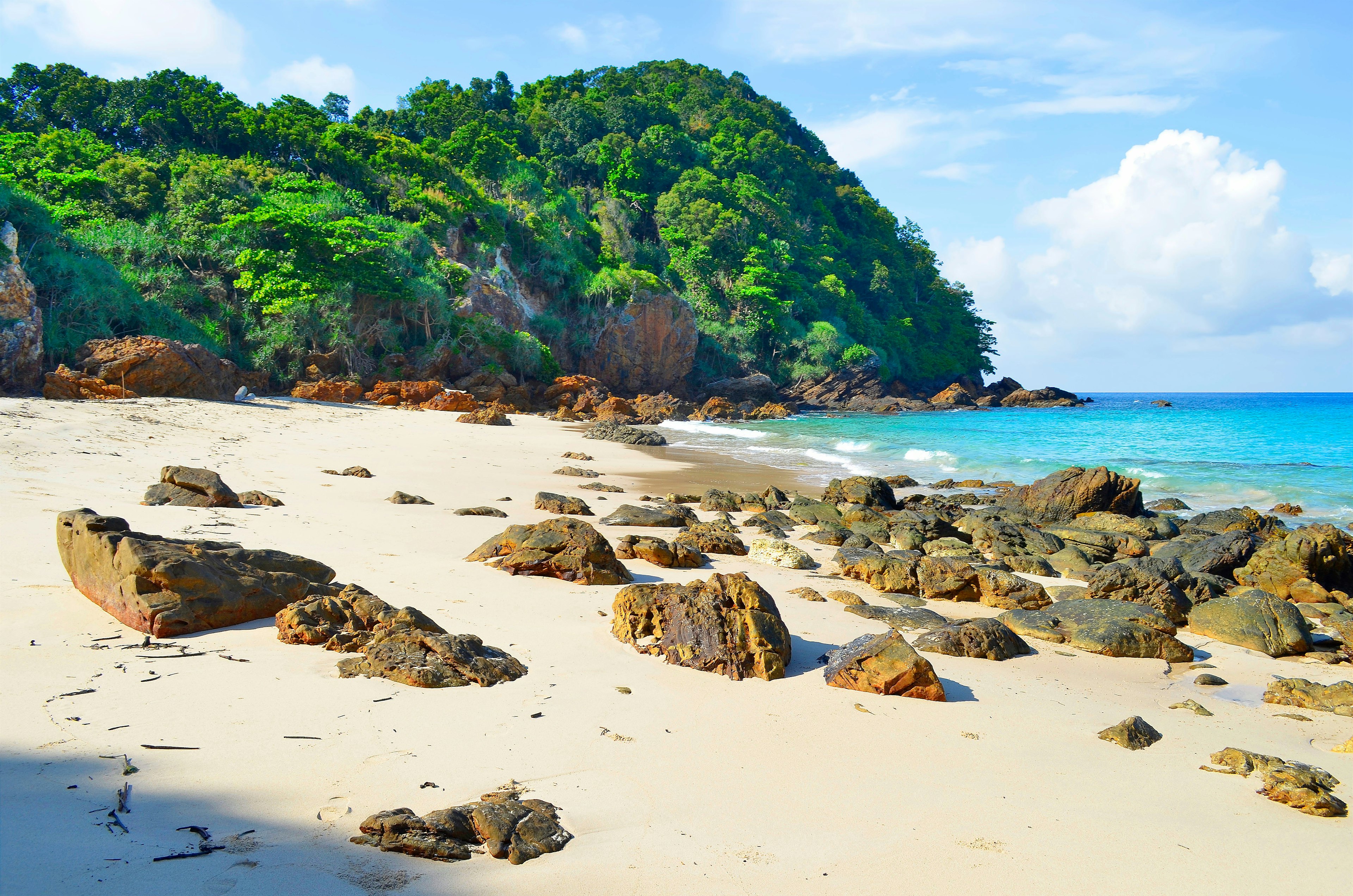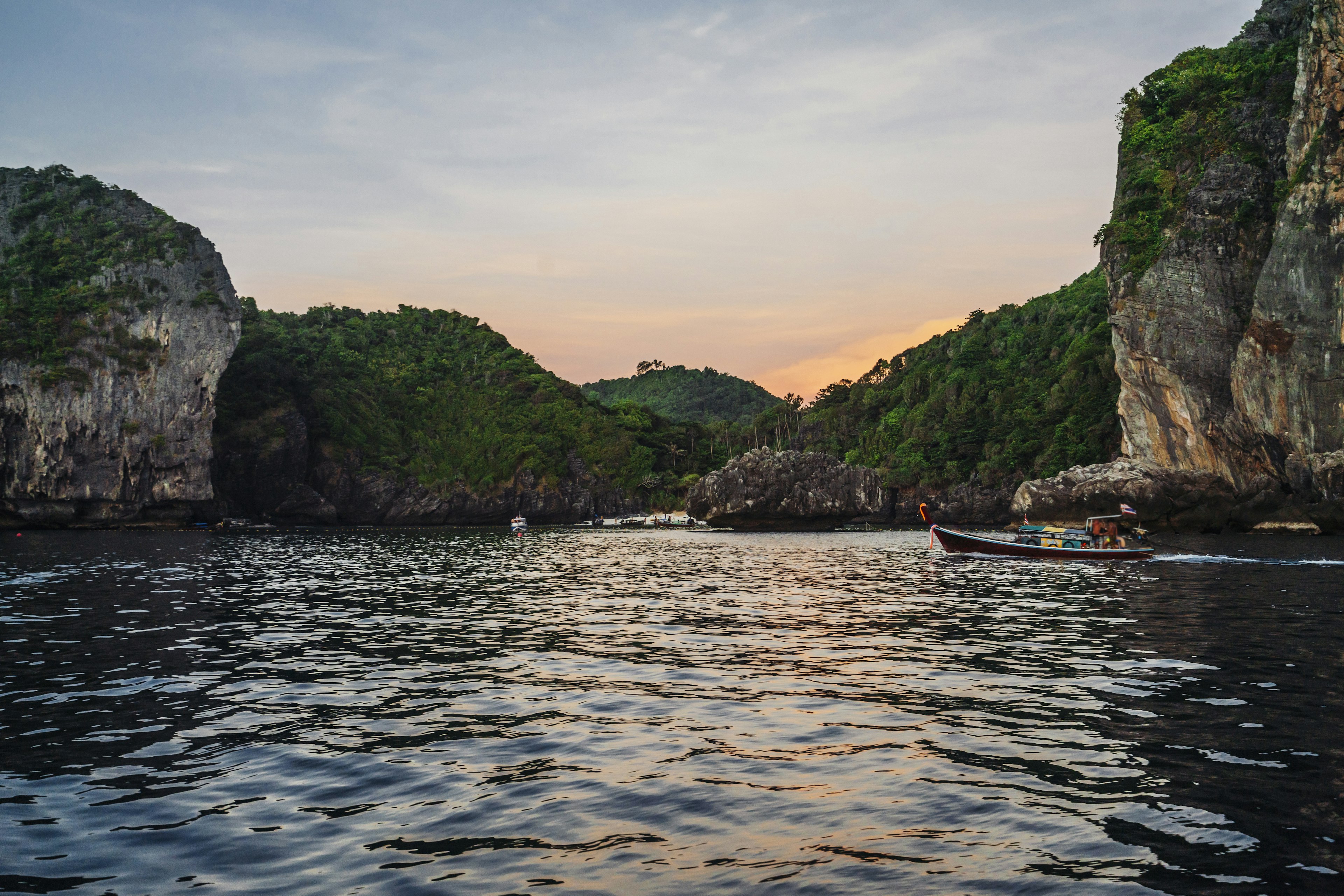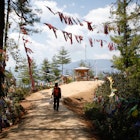

From Phi Phi to Phuket, from Krabi to Ko Samui, here are the best beaches in Thailand © Oscar Wong / Getty Images
White sand, turquoise waters and palm trees are on the itinerary of just about every visitor to Thailand. And in this respect, the country delivers.
Over 1500 miles of coastline and 1430 islands means a lot of postcard-perfect beaches. And when you’re finished sunbathing, many of these sandy areas also offer activities such as snorkeling, diving or rock climbing, not to mention access to Thailand’s amazing cuisine and unique cultural experiences.
Simply put, it's all a bit overwhelming. To help you make the call, we’ve put together a list of Thailand’s best beaches. There’s a lot to choose from, so we’ve tried to touch on every coastal region of the country, featuring a mix of beaches – listed here in no particular order – that are on the beaten path and islands that take a bit more work to get to.

1. Railay, Krabi Province
With an almost stage-like backdrop of sheer, towering karst cliffs, Railay, in Krabi Province, boasts the most dramatic setting of just about any beach in Thailand. Those cliffs – as well as the karst formations that jut out from the sea – are also great for climbing, with lots of established routes. Alternatively, if you don’t want to strap on a harness, make the hike to Railay’s lagoon, which involves a stop that offers amazing views over the peninsula. Railay is also well positioned for boat jaunts to ocean-based climbing spots in the area or trips to hidden beaches and snorkeling spots in Phang-Nga Bay.
Planning tip: Railay is not on an island, but those cliffs mean that it can only be reached by boat from Ao Nang, Ko Phi-Phi, Krabi or Ao Nam Mao.
2. Tubtim Bay, Ko Samet, Rayong Province
Although sometimes dismissed as little more than the easiest island retreat from Bangkok, Ko Samet is a seriously beautiful island. Its sand is so white and fine, it’s been eulogized in Thai literature. Tubtim Bay, on the island’s east shore, offers an excellent balance of good accommodation, a solid restaurant and a great beach as well as access to semi-hidden, lesser-known coves and tiny beaches.
Local tip: More popular with Thais than foreigners, Ko Samet also offers something of a cultural experience, drawing lots of Thai university students and the domestic LGBTIQ+ crowd. A late-night, beachside acoustic guitar session fueled by a bottle of Sang Som is the classic Ko Samet experience.

3. Ko Kut, Trat Province
Few of those in search of a Thai beach opt to head to the country’s east, but those who make it there will be rewarded by some of Thailand’s most beautiful – and little-visited – islands. Perched at the edge of the Gulf of Thailand – just across from Cambodia – Ko Kut is the remotest of a tiny archipelago of islands that includes the more well-known Ko Chang. The beaches here, especially those on the island’s west coast, such as Hat Khlong Chao, have sand as fine as talcum powder and more palm trees than hotels. Being the fourth-largest island in Thailand means there’s also much to explore both on the coast and inland, including waterfalls and day hikes.
Planning tip: Ko Kut is accessed via Laem Sok, in Trat Province. If Cambodia is on your itinerary, it’s possible to cross the border at Hat Lek.
4. Surin Islands Marine National Park, Phang Nga Province
This archipelago of five islands is one of Thailand’s premier diving spots. But above sea level, the protected natural refuge offers snow-white sand, jade and turquoise-hued water, rocky headlands, rugged jungle and lots of wildlife. Ko Surin Nuea, home to the island's only accommodation and restaurant, is one of the best spots to appreciate this. Ko Surin Tai, one of the islands, is home to a relocated community of Moken, also known as Sea Gypsies. Before the 2004 tsunami, they were among the only groups of humans who lived predominantly at sea.
Planning tip: The only way to overnight here is via national park accommodation on Ko Surin Nuea. Rooms – or tents – can be booked via the DNP official online portal once in Thailand or through agents on the mainland in Khuraburi (who also operate transportation to and from the islands).

5. Maya Bay, Krabi Province
Maya Bay, located on an island that forms part of the Hat Noppharat Tara – Mu Ko Phi Phi National Park, is one of Thailand’s most beautiful beaches. Indeed, its fine white sand, clear waters and palm trees were so perfect that it was featured in the 2000 film The Beach. Unfortunately, this cameo caused it to follow the same thematic fall from grace as the fictional atoll: too many people found out about it.
In 2018, Thai authorities decided to close Maya Bay. After a clean-up program and some time for the natural environment to recover, it reopened in 2022 with strict restrictions on visitor numbers, duration (one hour), activities (swimming is not allowed) and strict sustainability goals.
Planning tip: Access to Maya Bay via speedboats from Krabi, Ko Phi-Phi Don and Ko Lanta is generally banned between August and October. It’s not possible to overnight there at any time of year.
6. Ao Khanom, Nakhon Si Thammarat Province
For beautiful, relatively undiscovered stretches of sand mostly untouched by tourists, head to Nakhon Si Thammarat Province, a 12-hour bus or 15-hour train ride (or a one-hour flight) from Bangkok. In the northern part of the province is Ao Khanom, a lengthy, picture-perfect tropical bay where you’re more likely to encounter more local fishers and their brightly-colored boats – and if you’re lucky, one of the region’s adorable pink dolphins – than crowds.
Local tip: Consider a side trip just south to Sichon District, where the Buddhist temple Wat Chedi is known as Thailand’s Chicken Temple. The devout leave cement roosters as offerings here, and tens of thousands of them, including some larger than a long-tailed boat, can be found in an adjacent chicken cemetery.

7. Sunset Beach, Ko Kradan, Trang Province
Trang Province boasts some of Thailand’s most stunning beachy areas. Yet, removed from the beaten track, they see relatively few visitors. Arguably the handsomest of the lot is Ko Kradan, an island with slender, silky white sand beaches ringing a lush, jungly interior. Development is minimal on the island, but if you really want to escape it all, head to Sunset Beach, a tiny, rocky, secluded beachy outpost on the island’s western shore.
Planning tip: Trang, the landlocked provincial capital and likely your access to the island, is one of Thailand’s best food cities. Be sure to tack on a night here to take advantage of the city’s excellent dim sum halls, noodle shacks and markets.
8. Bottle Beach, Ko Pha-Ngan, Surat Thani Province
Ko Pha-Ngan has drawn backpackers with its laid-back vibe since the 1970s. These days, the infamous Full Moon is the island’s biggest attraction, but even if you’re not looking to party, there are lots of quiet, coastal, sandy places to choose from. Hat Khuat, also known as Bottle Beach and located on the island’s northern shore, takes the form of a dreamy slice of white sand backed by green hills and fronted by turquoise waters. When you’re finished sunbathing, there’s opportunity for swimming, snorkeling or even a day hike to a nearby fishing village.
Planning tip: The quietest months on Ko Pha-Ngan are April to June.

9. Nui Beach, Phuket
Big-hitter Phuket beaches such as Patong and Kamala get all the press, which means they also draw all the crowds and touts. For something off the beaten track, head to this semi-hidden beach on the island’s far southern shore. Accessible via a two-mile walk down a steep hill (or a brief, bumpy ride in the back of the truck), Nui Beach takes the form of a petite cove attractively framed by palm trees and massive boulders. There’s a handful of low-key bars and restaurants, and although you won’t be alone, you almost certainly won’t feel like part of the crowd.
Local tip: Nui Beach has emerged as something of an Instagram posing ground with swings, frames and photogenic seats set up at the beach's perimeter for that perfect shot.
10. Ko Lipe, Satun Province
Among Thai tourists, Ko Lipe has been the “it” island escape for several years now. This is likely due to its remote location and access to some of the best diving in the region. Some unpleasant inland development has followed as a result of this, but the island’s two longest beaches, Sunset Beach and Sunrise Beach, are still stunners: salt-white crescents of sand backed by jungly hills, with access to nearby protected reefs.
Planning tip: Ko Lipe is generally only accessible from mid-October to mid-May via boats to/from Pak Bara in Satun. Have aspirations to go beyond Thailand? Boats link Ko Lipe and Pulau Langkawi in Malaysia.
Explore related stories

Beaches
Thailand itineraries: 5 incredible routes to explore the countryJan 21, 2025 • 11 min read



 Beaches11 places around the world for an inexpensive tropical vacation
Beaches11 places around the world for an inexpensive tropical vacationNov 13, 2024 • 9 min read





